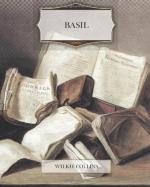III.
I always considered my father—I speak of him in the past tense, because we are now separated for ever; because he is henceforth as dead to me as if the grave had closed over him—I always considered my father to be the proudest man I ever knew; the proudest man I ever heard of. His was not that conventional pride, which the popular notions are fond of characterising by a stiff, stately carriage; by a rigid expression of features; by a hard, severe intonation of voice; by set speeches of contempt for poverty and rags, and rhapsodical braggadocio about rank and breeding. My father’s pride had nothing of this about it. It was that quiet, negative, courteous, inbred pride, which only the closest observation could detect; which no ordinary observers ever detected at all.
Who that observed him in communication with any of the farmers on any of his estates—who that saw the manner in which he lifted his hat, when he accidentally met any of those farmers’ wives—who that noticed his hearty welcome to the man of the people, when that man happened to be a man of genius—would have thought him proud? On such occasions as these, if he had any pride, it was impossible to detect it. But seeing him when, for instance, an author and a new-made peer of no ancestry entered his house together—observing merely the entirely different manner in which he shook hands with each—remarking that the polite cordiality was all for the man of letters, who did not contest his family rank with him, and the polite formality all for the man of title, who did—you discovered where and how he was proud in an instant. Here lay his fretful point. The aristocracy of rank, as separate from the aristocracy of ancestry, was no aristocracy for him. He was jealous of it; he hated it. Commoner though he was, he considered himself the social superior of any man, from a baronet up to a duke, whose family was less ancient than his own.
Among a host of instances of this peculiar pride of his which I could cite, I remember one, characteristic enough to be taken as a sample of all the rest. It happened when I was quite a child, and was told me by one of my uncles now dead—who witnessed the circumstance himself, and always made a good story of it to the end of his life.
A merchant of enormous wealth, who had recently been raised to the peerage, was staying at one of our country houses. His daughter, my uncle, and an Italian Abbe were the only guests besides. The merchant was a portly, purple-faced man, who bore his new honours with a curious mixture of assumed pomposity and natural good-humour. The Abbe was dwarfish and deformed, lean, sallow, sharp-featured, with bright bird-like eyes, and a low, liquid voice. He was a political refugee, dependent for the bread he ate, on the money he received for teaching languages. He might have been a beggar from the streets; and still my father would have treated him as the principal guest in the house, for this all-sufficient reason—he was a direct descendant of one of the oldest of those famous Roman families whose names are part of the history of the Civil Wars in Italy.




